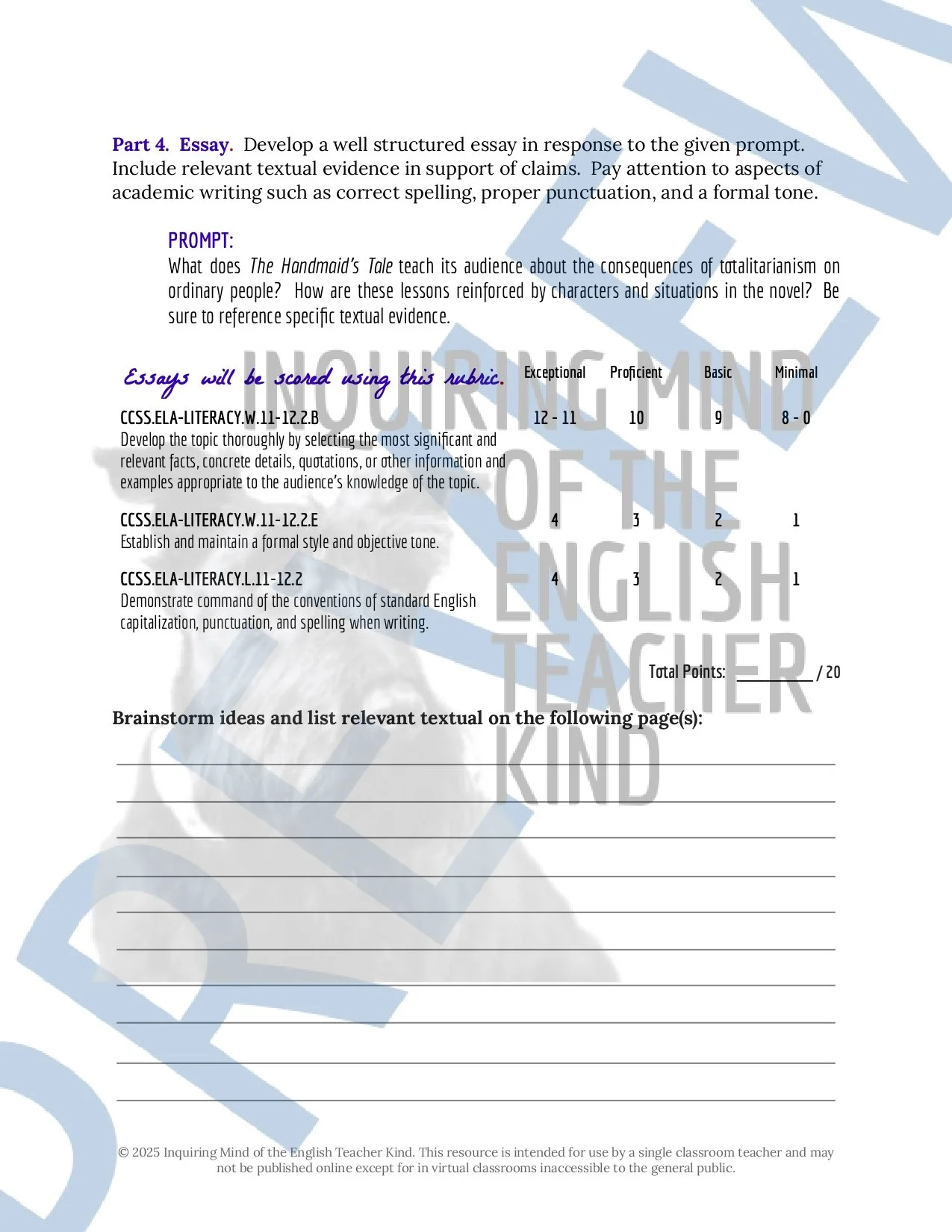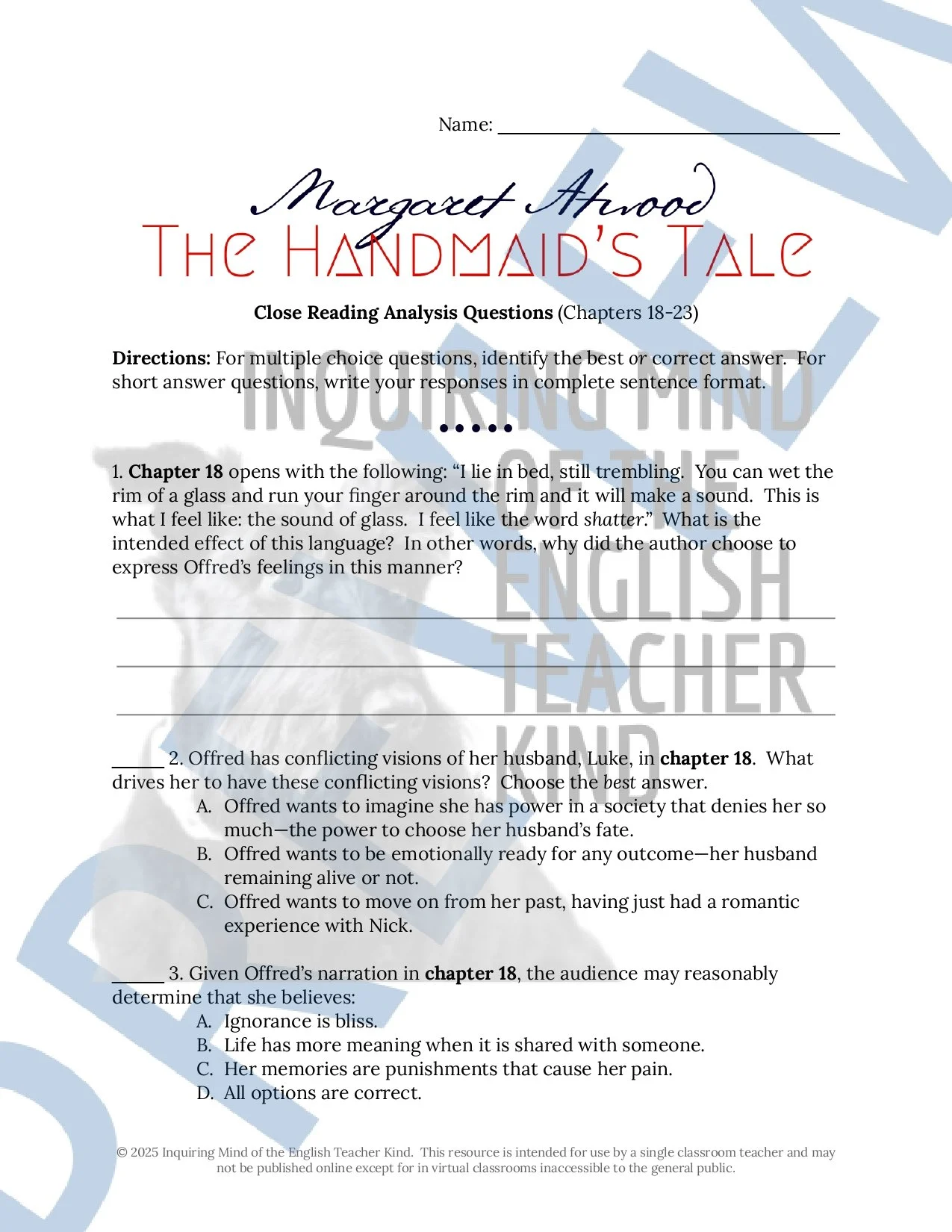 Image 1 of 12
Image 1 of 12

 Image 2 of 12
Image 2 of 12

 Image 3 of 12
Image 3 of 12

 Image 4 of 12
Image 4 of 12

 Image 5 of 12
Image 5 of 12

 Image 6 of 12
Image 6 of 12

 Image 7 of 12
Image 7 of 12

 Image 8 of 12
Image 8 of 12

 Image 9 of 12
Image 9 of 12

 Image 10 of 12
Image 10 of 12

 Image 11 of 12
Image 11 of 12

 Image 12 of 12
Image 12 of 12













The Handmaid's Tale Research Project on Women's History and Human Rights
The Handmaid's Tale by Margaret Atwood lends itself to compelling research opportunities for high school students. This low-prep, standards-based project has students investigate topics related to women's history and human rights around the world: from America (the Fourteenth Amendment, Equal Pay Act, Equal Rights Amendment, etc.) to Canada (the Royal Commission on the Status of Women in Canada, National Inquiry into Missing and Murdered Indigenous Women and Girls, etc.), from the Middle East (Benazir Bhutto, the Taliban's treatment of women, the Organization of Women's Freedom in Iraq, etc.) to Mexico (Laureana Wright de Kleinhans, First Feminist Congress of the Yucatan, etc.). Thirty-nine topics are addressed. Supporting materials—including a detailed scoring rubric—are provided. Materials are delivered in Word Document and PDF formats. (Alternatively, a Google Drive option is available.) Ultimately, students will perform the following tasks:
Articulate connections between a research topic and the assigned text
Conduct research using available resources
Collect and classify reliable sources
Develop successful methods of recording information
Evaluate the credibility of nonfiction texts, taking into consideration readability, date, relevance, expertise, and bias
Apply conventions of MLA formatting
Correctly site resources to avoid plagiarism
Organize information in a cohesive manner, using a note-taking system that includes summary, paraphrasing, and quoted material
Analyze, synthesize, and integrate information, generating a thoughtfully comprehensive report, free of generalities and redundancies
Present information in a formal, coherent manner
Materials are available for a range of dystopian texts:
The Handmaid's Tale by Margaret Atwood lends itself to compelling research opportunities for high school students. This low-prep, standards-based project has students investigate topics related to women's history and human rights around the world: from America (the Fourteenth Amendment, Equal Pay Act, Equal Rights Amendment, etc.) to Canada (the Royal Commission on the Status of Women in Canada, National Inquiry into Missing and Murdered Indigenous Women and Girls, etc.), from the Middle East (Benazir Bhutto, the Taliban's treatment of women, the Organization of Women's Freedom in Iraq, etc.) to Mexico (Laureana Wright de Kleinhans, First Feminist Congress of the Yucatan, etc.). Thirty-nine topics are addressed. Supporting materials—including a detailed scoring rubric—are provided. Materials are delivered in Word Document and PDF formats. (Alternatively, a Google Drive option is available.) Ultimately, students will perform the following tasks:
Articulate connections between a research topic and the assigned text
Conduct research using available resources
Collect and classify reliable sources
Develop successful methods of recording information
Evaluate the credibility of nonfiction texts, taking into consideration readability, date, relevance, expertise, and bias
Apply conventions of MLA formatting
Correctly site resources to avoid plagiarism
Organize information in a cohesive manner, using a note-taking system that includes summary, paraphrasing, and quoted material
Analyze, synthesize, and integrate information, generating a thoughtfully comprehensive report, free of generalities and redundancies
Present information in a formal, coherent manner
Materials are available for a range of dystopian texts:

Preview this resource:
The Handmaid's Tale by Margaret Atwood lends itself to compelling research opportunities for high school students. This low-prep, standards-based project has students investigate topics related to women's history and human rights around the world: from America (the Fourteenth Amendment, Equal Pay Act, Equal Rights Amendment, etc.) to Canada (the Royal Commission on the Status of Women in Canada, National Inquiry into Missing and Murdered Indigenous Women and Girls, etc.), from the Middle East (Benazir Bhutto, the Taliban's treatment of women, the Organization of Women's Freedom in Iraq, etc.) to Mexico (Laureana Wright de Kleinhans, First Feminist Congress of the Yucatan, etc.). Thirty-nine topics are addressed. Supporting materials—including a detailed scoring rubric—are provided.



















































































































































































